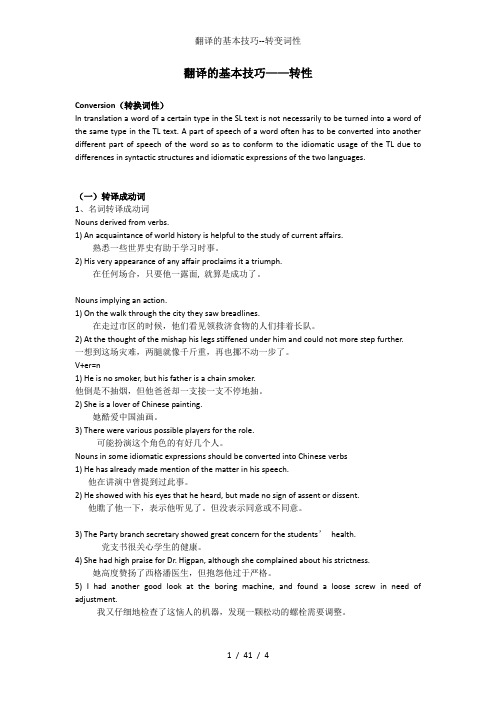翻译的基本技巧--转变词性
句子翻译技巧一:词类转换

example
1967年联合国文件要求在以色列撤出所占 的土地以及阿拉伯承认以色列的生存权 利的基础上来解决中东冲突。
example
• 2.The sight and sound of our jet planes filled me with special longing.
• 看到我们的喷气式飞机,听见隆隆的 机声,令我特别神往。含有动作意味 的名词(在记叙、描写文体中出现较 多)往往可以转译成动词。
• 说以身作则是影响人的主要方法,那是 不对的。它是影响人的唯一方法。
• Wait for a break in the traffic before crossing the road.
• 要等到暂无车辆来往时,才能过马路。
example
• To some extent it gets into the question of the chicken or the egg.
3. 形容词译成动词
形容词转译成副词
英语名词译成汉语动词时,修 饰该名词的形容词往往转译 成汉语副词
example
• It was a clear and unemotional exposition of the President's reasons for willing to begin a Chinese-American dialogue.
example
• The car braked sharply, coming to rest on the edge of the cliff.
• 汽车猛的刹住,停在悬崖边上.
example
• They took a final look at Iron Tower, still intact in the darkness.
翻译方法—词性转换

Until such time as mankind has the sense
to lower its population to the points where the planet can provide a comfortable support for all, people will have to accept more " unnatural food".
“印象”在汉语中只有名词词性,但英译时既可用名词 “impression”,也可用动词“impress”来表达。
2. 这种举止是罪犯的心理特征。 1. 他在剧中精彩的表演给我留下深刻的印象。
•This kind of behavior characterizes the criminal mind.
IBM公司计划拿出一些新产品与外国公司竞争。
2. 名词转译成形容词
(1)由形容词派生的名词 (2)a ∕ an+名词作表语时 a. The music is a gas. 这音乐妙极了。 As he is a perfect stranger in the city, I hope you will give him the necessary help. 他对这个城市完全陌生,我希望您能给他必要的帮助。
everything about the book except its publication.
•还有一些人同意这本书的每一句话,就是不同意出版这本书。
Rockets have found application for the exploration of the universe.
火箭已用来探索宇宙。
我们欢迎您周日晚到我校作报告。 这里的“speaker” 是由“speak+er”构成的名词,与 “guest” 组成“特邀演讲者”,“特邀报告者”,但如果将上句直译 成“欢迎您周日到我校当特邀演讲者”不很规范,显得说话 者汉语表达不地道。既然这样,不妨将“a guest speaker”转 换成动词,更通顺。
翻译的基本技巧--转变词性

翻译的基本技巧——转性Conversion(转换词性)In translation a word of a certain type in the SL text is not necessarily to be turned into a word of the same type in the TL text. A part of speech of a word often has to be converted into another different part of speech of the word so as to conform to the idiomatic usage of the TL due to differences in syntactic structures and idiomatic expressions of the two languages.(一)转译成动词1、名词转译成动词Nouns derived from verbs.1) An acquaintance of world history is helpful to the study of current affairs.熟悉一些世界史有助于学习时事。
2) His very appearance of any affair proclaims it a triumph.在任何场合,只要他一露面, 就算是成功了。
Nouns implying an action.1) On the walk through the city they saw breadlines.在走过市区的时候,他们看见领救济食物的人们排着长队。
2) At the thought of the mishap his legs stiffened under him and could not more step further.一想到这场灾难,两腿就像千斤重,再也挪不动一步了。
英语翻译技巧中词性的转化策略分析

英语翻译技巧中词性的转化策略分析在英语翻译中,常常会面临需要将某个词语的词性进行转化的情况,这种情况在词汇丰富的英语中尤为常见。
为了在翻译过程中准确传达语义,翻译者需要灵活运用多种策略对词性进行转化。
一、名词转动词。
名词转动词是英语中最常见的词性转化之一。
英语中很多名词可以转化为动词,如:love(爱),problem(问题),memory(记忆)等。
这些名词转化为动词时可以直接在后面加上动词后缀,如-ize,-ate,-ify等,例如:love→love+ize=lovelize(使……爱上),problem→problem+ize=problemize(使……成为问题),memory→memory+ize=memorize(记忆)。
三、形容词转副词。
在英语中,很多形容词也可以转化为副词,如quick(快速的),slow(缓慢的),happy (快乐的)等。
将形容词转化为副词的方式是添加-adverb后缀。
例如:quick→quick+ly=quickly(快速地),slow→slow+ly=slowly(缓慢地),happy→happy+ly=happily(快乐地)。
动词转化为形容词是英语中较为少见的词性转化之一,但也是翻译中常见的情况。
将动词转化为形容词的方法是在动词后面添加形容词后缀,如-able,-ible,-ful等。
例如:talk→talk+able=talkable(健谈的),laugh→laugh+able=laughable(可笑的),help→help+ful=helpful(有帮助的)。
总之,在英语翻译中,正确应用词性转化策略可以更准确地传达语义,提高翻译的质量和效率。
不同词性转化之间的界限有时不是很明确,所以在选择和使用转化策略的时候,需要根据具体语境和意义做出正确的判断。
英语翻译技巧中词性的转化策略分析

英语翻译技巧中词性的转化策略分析
引言:
词性的转化是翻译过程中常见的问题之一,正确的处理词性的转化可以确保译文的准确性和流畅性。
本文将分析英语翻译技巧中处理词性转化的策略。
一、名词转化为动词:
将名词转化为动词是常见的词性转化。
英语中的名词“concept”可以转化为动词“conceptualize”,译文可以为“概念化”,这样可以更准确地表达原文的含义。
对于名词转化为动词的处理,有以下几个策略:
1. 添加动词后缀:可以根据英语动词的后缀规则,如“-ize”、“-ate”、“-en”等来将名词转化为动词。
名词“length”可以转化为动词“lengthen”,译文可以为“延长”。
2. 使用合适的动词短语:有些名词转化为动词不便使用后缀的情况下,可以使用动词短语来表示。
名词“decision”可以转化为“make a decision”,译文可以为“做决定”。
四、副词转化为形容词:
副词转化为形容词相对较少见,但也是需要处理的词性转化之一。
英语中的副词“fast”可以转化为形容词“fastest”,译文可以为“最快的”。
结论:
词性的转化在英语翻译中常常遇到,合理处理词性转化可以提高翻译的准确性和流畅性。
通过添加合适的后缀或使用相应的短语,可以将词性转化得更恰当。
需要根据具体语境和要求选择最合适的处理策略。
以上分析的策略可以作为英语翻译中处理词性转化的参考。
翻译的词性转换技

转译成动词
1. Rockets have found application for the exploration of the universe. 2. In China, there is a lot of emphasis on politeness. 3. A careful study of the original text will give you a better translation. 4. The sight and sound of our jet planes filled me with special longing. 5. He is a good singer. 6. Those small factories are also lavish consumer and waster of raw materials.
7. You must be tired. Why don’t you take a rest? 8. I am anxious about his health. 9. Doctors have said that they are not sure they can save his life. 10. Scientists are confident that all matter is indestructible. 11. She opened the window to let fresh air in. 12. After careful investigation they found the design behind.
翻译技巧丨英语翻译之词性转换
翻译技巧丨英语翻译之词性转换泛瑞翻译一、转译成动词例如:I admire your decision to fight for the difficulties in preparing the examination.译文:你决定战胜复习考试中的困难,这一点我很羡慕。
(一)名词转译成动词1.由动词派生的名词转译成动词。
Rockets have found application for the exploration of the universe.火箭已经用来探索宇宙。
In China, there is a lot of emphasis on politeness.在中国,人们非常注重讲礼貌。
2.含有动作意味的名词往往可以转译成动词。
A careful study of the original text will give you a better translation.仔细研究原文,你会翻译得更好。
The sight and sound of our jet planes filled me with special longing.看到我们的喷气式飞机,听见隆隆的机声,令我特别神往。
3.英语(论坛)中有些加后缀-er的名词,He is a good singer.他唱歌唱得好。
Those small factories are also lavish consumer and waster of raw materials.那些小工厂还在极大的消耗和浪费原材料。
4.有些短语中作为中心主体词的名词往往可转译成动词,如To have a rest 和To have a good look at 里的rest 和look.You must be tired. Why don’t you take a rest?你一定很累了,为什么不休息一会呢?The car braked sharply, coming to rest on the edge of the cliff.汽车猛的刹住,停在悬崖边上。
英汉翻译中词性转换的技巧-PPT资料
(3) Cheerful, efficient and warm-hearted, they will do everything to make your journey smooth and comfortable.
他们乐观、能干、热情,总是想方设法使你一路 上顺利舒适。(状语转换为谓语)
句子成分转换是指英语中的某一句子成分译成汉语时 转换成另一种句子成分。句子成分转换在主语、谓语、
宾语、定语、状语和补语之间展开。
(1) You can always tell the somebodies from the nobodies at a cocktail party. The somebodies come late. 在鸡尾酒会上人们常常可以看出大人物和无名小卒来。那 些迟到的就是大人物。(主语转换为表语;谓语转换为主 语)
她到车站不一会儿,他便出现在她的身旁,听见他喘息的 声音。她凝视着前方,表情严峻。
(5) Yet to both classes the need of an alternative outlook, of a change of atmosphere, of a diversion of effort, is essential.
(13) Most US spy satellites are designed to burn up in the earth's atmosphere after completing their missions.
美国绝大多数间谍卫星,按其设计,是在完成使命后,在 大气层中焚毁。
二、 句子成分转换
(9) He added: "I understand and respect those views, but I deeply believe in the correctness of my decision." 他还说:"我理解并尊重他们的看法,但我深信我的决定 是正确的。"
英语翻译技巧中词性的转化策略分析
英语翻译技巧中词性的转化策略分析在英语翻译中,一个重要的问题是如何正确处理词性的变化。
在翻译过程中,词性转化是非常常见的现象,比如从名词转化为动词,从动词转化为形容词,从形容词转化为副词等等。
对于词性转化的处理,需要掌握一些策略和技巧,以确保翻译的准确性和自然度。
1. 名词转化为动词在英语中,名词转化为动词是非常常见的现象。
这种转化通常是通过在名词前加上“to”或者“-ize”来实现的。
例如,将“fame”转化为动词可以变成“to fame”或者“to glamorize”。
在翻译中,将名词转化为动词的情况比较多见。
如果在意思上存在对应的动词,建议直接使用相应的动词进行翻译。
如果没有对应的动词,可以使用上述的转化方式进行处理。
但需要注意,在某些语境中,这种转化方式可能会使翻译变得过于生硬或不自然,需要根据具体情况进行把握。
在翻译中,将形容词转化为副词较为常见。
如果在语境中需要使用副词修饰动词或者形容词,可以考虑根据上述规则进行翻译。
但需要注意,有些形容词并没有对应的副词形式,或者副词形式意义与原词有所区别,需要根据具体情况加以处理。
和形容词转化为副词相反,副词转化为形容词通常比较困难,因为很少有副词可以直接转化为形容词。
但是,在一些情况下,可以通过在副词前加上某些特殊的词汇来实现转化。
例如,“very”可用于修饰形容词和副词,可以将“quickly”变成“very quick”。
总之,词性的转化在英语翻译中是一项非常关键的任务。
对于不同的词性转化方式,需要掌握相应的策略和技巧,以确保翻译的准确性和自然度。
同时需要注意,在进行词性转化时,需要根据具体语境和意义进行把握。
英语翻译技巧中词性的转化策略分析
英语翻译技巧中词性的转化策略分析
在英语翻译中,词性的转化是一种常见的技巧,它可以通过改变词的词性来表达不同
的意思或者将句子翻译得更加准确。
一、名词转动词
将名词转化为动词可以使句子更加动态和有力,表达行为和动作。
例句:The sun shines brightly.(太阳明媚地照耀着。
)
分析:将名词“sun”转化为动词“shine”,使句子表达得更加活跃和生动。
二、名词转形容词
将名词转化为形容词可以修饰名词,起到形容和限定的作用。
例句:A cat-like smile appeared on her face.(她脸上浮现出猫一样的微笑。
)
分析:将名词“cat”转化为形容词“cat-like”,修饰名词“smile”,使句子更加
形象和生动。
三、名词转副词
将名词转化为副词可以修饰动词,表示方式、程度或者时间。
例句:He spoke softly.(他轻声地说。
)
分析:将名词“soft”转化为副词“softly”,修饰动词“speak”,表示说话的方式。
例句:The swim was refreshing.(游泳使人感到心旷神怡。
)
分析:将动词“swim”转化为名词“swim”,通过加上冠词“the”表示特定的动作,并将其形容为令人耳目一新的状态。
总的来说,词性的转化是英语翻译中常用的技巧之一。
通过改变词的词性,可以使句
子更加具体、清晰和生动,从而准确地传达原文的意思。
在进行词性转化时,需要根据具
体的语境和需要进行选择,并且要注意转化后的词是否符合语法规则和上下文的逻辑关
系。
- 1、下载文档前请自行甄别文档内容的完整性,平台不提供额外的编辑、内容补充、找答案等附加服务。
- 2、"仅部分预览"的文档,不可在线预览部分如存在完整性等问题,可反馈申请退款(可完整预览的文档不适用该条件!)。
- 3、如文档侵犯您的权益,请联系客服反馈,我们会尽快为您处理(人工客服工作时间:9:00-18:30)。
翻译的基本技巧——转性Conversion(转换词性)In translation a word of a certain type in the SL text is not necessarily to be turned into a word of the same type in the TL text. A part of speech of a word often has to be converted into another different part of speech of the word so as to conform to the idiomatic usage of the TL due to differences in syntactic structures and idiomatic expressions of the two languages.(一)转译成动词1、名词转译成动词Nouns derived from verbs.1) An acquaintance of world history is helpful to the study of current affairs.熟悉一些世界史有助于学习时事。
2) His very appearance of any affair proclaims it a triumph.在任何场合,只要他一露面, 就算是成功了。
Nouns implying an action.1) On the walk through the city they saw breadlines.在走过市区的时候,他们看见领救济食物的人们排着长队。
2) At the thought of the mishap his legs stiffened under him and could not more step further.一想到这场灾难,两腿就像千斤重,再也挪不动一步了。
V+er=n1) He is no smoker, but his father is a chain smoker.他倒是不抽烟,但他爸爸却一支接一支不停地抽。
2) She is a lover of Chinese painting.她酷爱中国油画。
3) There were various possible players for the role.可能扮演这个角色的有好几个人。
Nouns in some idiomatic expressions should be converted into Chinese verbs1) He has already made mention of the matter in his speech.他在讲演中曾提到过此事。
2) He showed with his eyes that he heard, but made no sign of assent or dissent.他瞧了他一下,表示他听见了。
但没表示同意或不同意。
3) The Party branch secretary showed great concern for the students’health.党支书很关心学生的健康。
4) She had high praise for Dr. Higpan, although she complained about his strictness.她高度赞扬了西格潘医生,但抱怨他过于严格。
5) I had another good look at the boring machine, and found a loose screw in need of adjustment.我又仔细地检查了这恼人的机器,发现一颗松动的螺栓需要调整。
Nouns in the cognate object into verbs.1) He smiled a happy smile.他愉快地微笑了一下。
2) Let him sleep a peaceful sleep.让他安安静静地睡一觉吧。
3) They fought a beautiful fight .他们打了一个漂亮仗。
4) He sighed a long sigh.他长长地叹了一口气。
2、介词转译成动词1) Up the street they walked, past stores, across a broad square, and then entered a high building.他们沿着大街走去,经过许多商店,穿过一个大广场,然后进入了一座大厦。
2) We drove home a bit after midnight, over the river and through the lively old sleeping town.时过午夜,我驱车回家,先过了河,又穿过了这在座酣睡中的古老而可爱的城市。
3) The judge sat in the dinning-room amid his morning mail.法官坐在餐厅里处理一大堆早班邮件。
4) I found him at his book when I came into the room.我走进房间,见他正在看书。
3、形容词转译成动词1) We are quite sure that the socialist system will replace the capitalist system in the end.我们坚信社会主义制度终将取代资本主义制度。
2) They were not content with their present achievements.他们不满足于他们目前所取得的成就。
3) They were suspicious and resentful of him.他们怀疑他,讨厌他。
4) If we were ignorant of the structure of the atom, it would be impossible for us to study nuclear physics.要是我们不知道原子的结构,我们就不可能去研究核物理。
4、副词转译成动词1) The successful fishermen of that day were already in.那天交上好运的渔民们都已回家。
2) When he went back, the radio was still on, for he had forgotten to turn it off when he left.他回来时,收音机还在响,因为他离开的时候忘记将它关掉了。
3) "Please let me in! They are searching for me." he begged.“请让我进去!他们正在追捕我。
”他恳求道。
动词转译成名词Verbs derived from nouns or used from nouns.1) The landing was designed to cut the peninsula in two.登陆的目的是要把该半岛一切为二。
2) The navy is now positioned to safeguard both the Pacific and Atlantic Oceans.海军现已摆下了阵势,防卫太平洋和大西洋。
3) On that day they were escorted to the Great Wall of China.他们那天和陪同人员一起去参观中国长城。
4) A well-dressed man, who looked and talked like an American, got into the car.一位衣冠楚楚的男人,外表和谈吐都像美国人,进了汽车。
(2) 有些英语被动式句子中的动词,可以译成“受(遭)到……+名词”、“予(加)以+名词”这类结构。
1) Lenin was beloved of the people.列宁受到人民的爱戴。
2) And he warned that the improvement in bilateral relations might be "jeopardized" by a continuation of the war.他警告说,如果战争继续下去,双边的关系有可能受到危害。
3) His image as a good student was badly tarnished.他作为好学生的形象已遭到很大的玷污。
4) He was snuffed by the top-ranking officials there.他受到那边高级官员们的冷遇。
5) He was received with honor by the government of the host country.他受到东道国政府的礼遇。
(3)形容词转译成名词1) They are going to build a school for the blind and the deaf.他们打算建一所盲聋学校。
2) The unlearned always pretend erudition.不学无术的人总是假装学识渊博。
3) In the history of literature there can be found some immortal masterpieces which are the swan songs of the dying.在文学史上可以看到有些不朽的名著是临死者的绝笔。
名词转译成形容词Nouns derived from adj.1) I recognized the absurdity of dealing with them through intermediaries.我认识到通过中间人跟他们打交道是愚蠢的。
2) He was still more surprised at the singularity of the stranger's appearance.他看到那个陌生人的外表非常古怪越发惊奇了。
3) We found difficulty in solving this complicated problem.我们觉得很难解决这个复杂的问题。
4) She promptly shepherded them out of the crowded living room and into the privacy of the library.她迅速把他们领出拥挤的客厅,带到了没人注意的图书馆。
